|
Books Should Be Free Loyal Books Free Public Domain Audiobooks & eBook Downloads |
|
|
Books Should Be Free Loyal Books Free Public Domain Audiobooks & eBook Downloads |
|
Essay/Short Nonfiction |
|---|
|
Book type:
Sort by:
View by:
|
By: John Muir | |
|---|---|
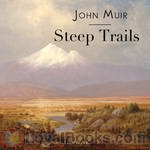 Steep Trails
Steep Trails
A collection of Muir's previously unpublished essays, released shortly after his death. "This volume will meet, in every way, the high expectations of Muir's readers. The recital of his experiences during a stormy night on the summit of Mount Shasta will take rank among the most thrilling of his records of adventure. His observations on the dead towns of Nevada, and on the Indians gathering their harvest of pine nuts, recall a phase of Western life that has left few traces in American literature... | |
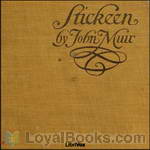 Stickeen
Stickeen
A great dog story, a well told tale — the naturalist and adventurer John Muir recounts how he and his companion, a dog named Stickeen, each, alone, confronted and conquered their fears of an icy Alaskan glacier in 1880. | |
By: William E. B. Du Bois (1868-1963) | |
|---|---|
 The Souls of Black Folk
The Souls of Black Folk
“Few books make history and fewer still become the foundational texts for the movements and struggles of an entire people....” One such great work was The Souls of Black Folk by William EB Du Bois. Published in 1903, it is a powerful and hard-hitting view of sociology, race and American history. It became the cornerstone of the civil rights movement and when Du Bois attended the first National Negro Conference in 1909, he was already well-known as a proponent of full and unconditional equality for African Americans... | |
By: John Donne (1572-1631) | |
|---|---|
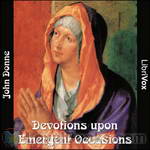 Devotions upon Emergent Occasions
Devotions upon Emergent Occasions
Devotions upon Emergent Occasions is a 1624 prose work by the English writer John Donne. It is a series of reflections that were written as Donne recovered from a serious illness, believed to be either typhus or relapsing fever. (Donne does not clearly identify the disease in his text.) The work consists of twenty-three parts describing each stage of the sickness. Each part is further divided into a Meditation, an Expostulation, and a Prayer. The seventeenth meditation is perhaps the best-known part of the work... | |
By: Joseph Trienens (b. 1863) | |
|---|---|
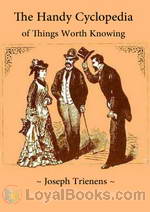 The Handy Cyclopedia of Things Worth Knowing
The Handy Cyclopedia of Things Worth Knowing
Written in 1910, this “cyclopedia” is full of information that was quite useful at the time. A hundred years later, its text is more humorous than practical — although some advice never goes out of style. | |
By: Andrew Murray (1828-1917) | |
|---|---|
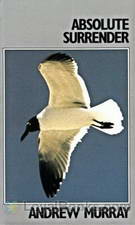 Absolute Surrender and Other Addresses
Absolute Surrender and Other Addresses
This is a series of short messages written by the South African minister, Andrew Murray. They deal with the necessity and joy of surrendering our lives completely to God. | |
By: Patrick Henry (1736-1799) | |
|---|---|
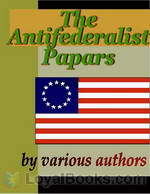 The Anti-Federalist Papers
The Anti-Federalist Papers
During the period of debate over the ratification of the Constitution, numerous independent local speeches and articles were published all across the country. Initially, many of the articles in opposition were written under pseudonyms, such as “Brutus”, “Centinel”, and “Federal Farmer”. Eventually, famous revolutionary figures such as Patrick Henry came out publicly against the Constitution. They argued that the strong national government proposed by the Federalists was a threat to the rights of individuals and that the President would become a king... | |
 Give Me Liberty or Give Me Death
Give Me Liberty or Give Me Death
This speech was given March 23, 1775, at St. John’s Church in Richmond, Virginia, and is credited with having singlehandedly convinced the Virginia House of Burgesses to pass a resolution delivering the Virginia troops to the Revolutionary War. In attendance were Thomas Jefferson and George Washington. Reportedly, the crowd, upon hearing the speech, jumped up and shouted, “To Arms! To Arms!” | |
By: Willa Sibert Cather (1873-1947) | |
|---|---|
 Collection Of Stories, Reviews And Essays
Collection Of Stories, Reviews And Essays
Stories and essays by Willa Cather | |
By: Emma Goldman (1869-1940) | |
|---|---|
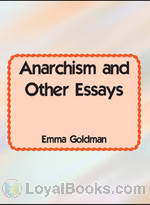 Anarchism and Other Essays
Anarchism and Other Essays
Chicago, May 4, 1886. In the Haymarket region of the city, a peaceful Labor Day demonstration suddenly turns into a riot. The police intervene to maintain peace, but they soon use violence to quell the mob and a bomb is thrown, resulting in death and injuries to scores of people. In the widely publicized trial that followed, eight anarchists were condemned to death or life imprisonment, convicted of conspiracy, though none of them had actually thrown the bomb. A young Russian immigrant, Emma Goldman, had arrived just the previous year in the United States... | |
By: Frederick Douglass (c.1818-1895) | |
|---|---|
 Collected Articles of Frederick Douglass
Collected Articles of Frederick Douglass
These two articles were reproduced as an e-book by Project Gutenberg in 2008 to supplement "...several articles by Frederick Douglass, whose larger work was presented in book form as a January, 1993 Project Gutenberg Etext to commemorate Martin Luther King Jr. Day...." The articles narrated here are "My Escape From Slavery" (1881) and "Reconstruction" (1866). | |
By: Francis Bacon (1561-1626) | |
|---|---|
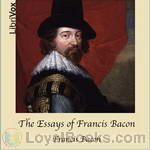 The Essays of Francis Bacon
The Essays of Francis Bacon
Among the many ideas explored in this book are beauty, gardens, honor and reputation, cunning, nobility, friendship and many others. Authored by the man who is credited with having invented the essay form in English, The Essays of Francis Bacon was written over an extended period, ranging from the mid sixteenth century. They were compiled in a single edition in 1597 and later re-written, enlarged and added to in other editions in 1612 and 1625. However, their compelling and insightful quality still appears fresh and appealing to modern day readers... | |
By: Matthew Arnold (1822-1888) | |
|---|---|
 Culture and Anarchy
Culture and Anarchy
Culture and Anarchy is a series of periodical essays by Matthew Arnold, first published in Cornhill Magazine 1867-68 and collected as a book in 1869. The preface was added in 1875. Arnold's famous piece of writing on culture established his High Victorian cultural agenda which remained dominant in debate from the 1860s until the 1950s. According to his view advanced in the book, "Culture [...] is a study of perfection". He further wrote that: "[Culture] seeks to do away with classes; to make the best that has been thought and known in the world current everywhere; to make all men live in an atmosphere of sweetness and light [... | |
By: William James (1842-1910) | |
|---|---|
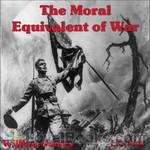 The Moral Equivalent of War
The Moral Equivalent of War
The Moral Equivalent of War, the last public utterance of William James, is significant as expressing the opinions of a practical psychologist on a question of growing popular interest. For the past fifteen years the movement for promoting international peace has been enlisting the support of organizations and individuals the world over. That this is a question on which much may be said for the opposition, James, though a pacificist, admits with his usual fair-mindedness, pointing out that militarism... | |
By: John Ruskin (1819-1900) | |
|---|---|
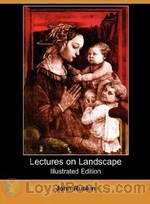 Lectures on Landscape
Lectures on Landscape
A series of lectures on landscape painting delivered at Oxford in 1871, by artist, critic, and social commentator, John Ruskin. | |
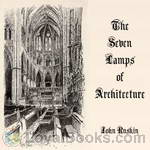 The Seven Lamps of Architecture
The Seven Lamps of Architecture
The Seven Lamps of Architecture, published in May 1849, is an extended essay written by the English art critic and theorist John Ruskin. The 'lamps' of the title are Ruskin's principles of architecture, which he later enlarged upon in the three-volume The Stones of Venice. To an extent, they codified some of the contemporary thinking behind the Gothic Revival. At the time of its publication A.W.N. Pugin and others had already advanced the ideas of the Revival and it was well under way in practice... | |
By: Thomas de Quincey (1785-1859) | |
|---|---|
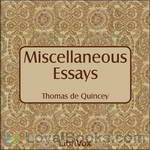 Miscellaneous Essays
Miscellaneous Essays
The Hunter Thompson of the 19th Century, de Quincey is best known for his Confessions of an English Opium Eater (an activity shared with his hero, Samuel Coleridge, much to Wordsworth’s dismay). However, de Quincey’s literary genius is best captured in his essays, and, according to Wikipedia: His immediate influence extended to Edgar Allan Poe, Fitz Hugh Ludlow and Charles Baudelaire, but even major 20th century writers such as Jorge Luis Borges admired and claimed to be partly influenced by his work. | |
By: Alexander Pope | |
|---|---|
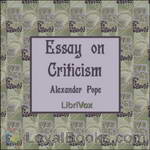 An Essay on Criticism
An Essay on Criticism
An Essay on Criticism was the first major poem written by the English writer Alexander Pope (1688-1744). However, despite the title, the poem is not as much an original analysis as it is a compilation of Pope’s various literary opinions. A reading of the poem makes it clear that he is addressing not so much the ingenuous reader as the intending writer. It is written in a type of rhyming verse called heroic couplets. | |
By: Henry L. Mencken | |
|---|---|
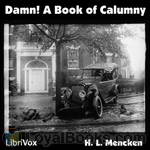 Damn! A Book of Calumny
Damn! A Book of Calumny
Henry Louis “H. L.” Mencken (1880 – 1956) was an American journalist, essayist, magazine editor, satirist, acerbic critic of American life and culture, and a student of American English. Known as the “Sage of Baltimore”, he is regarded as one of the most influential American writers and prose stylists of the first half of the 20th century. Mencken is perhaps best remembered today for The American Language, a multi-volume study of how the English language is spoken in the United States, and for his satirical reporting on the Scopes trial, which he named the “Monkey” trial.” | |
By: Irvin S. Cobb (1876-1944) | |
|---|---|
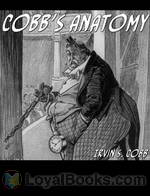 Cobb's Anatomy
Cobb's Anatomy
Irvin Shrewsbury Cobb was born on June 23, 1876. At seventeen years of age, he began writing for the Paducah Daily News, his hometown paper. At nineteen he became the managing editor; up to that point, our nation’s youngest. He worked as a columnist, a humorist and an author. But ‘horror,’ and ’short stories,’ are not why he is remembered. He is remembered because he was, and still is, funny. And although he is now dead–he died March 11, 1944–this work “Cobb’s Anatomy,” among others, has left an indelible mark upon mankind: a smile. | |
By: Alfred Russel Wallace (1823-1913) | |
|---|---|
 Is Mars Habitable?
Is Mars Habitable?
In 1907 Wallace wrote the short book Is Mars Habitable? to criticize the claims made by Percival Lowell that there were Martian canals built by intelligent beings. Wallace did months of research, consulted various experts, and produced his own scientific analysis of the Martian climate and atmospheric conditions. Among other things Wallace pointed out that spectroscopic analysis had shown no signs of water vapor in the Martian atmosphere, that Lowell’s analysis of Mars’ climate was seriously flawed and badly overestimated the surface temperature, and that low atmospheric pressure would make liquid water, let alone a planet girding irrigation system, impossible. | |
By: Fanny Dickerson Bergen (1846-1924) | |
|---|---|
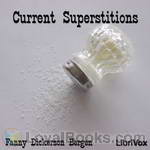 Current Superstitions
Current Superstitions
No matter how enlightened, chances are you’ve been raised around superstitious lore of one kind or another. Fanny Dickerson Bergen was one of the original researchers of North American oral traditions relating to such key life events and experiences as babyhood and childhood, marriage, wishes and dreams, luck, warts and cures, death omens and mortuary customs, and “such truck,” as Huck Finn would say. You’ll be surprised at how many of these old saws you’ll know. Here’s a quote from... | |
By: Friedrich Nietzsche (1844-1900) | |
|---|---|
 Case of Wagner / Nietzsche Contra Wagner / Selected Aphorisms
Case of Wagner / Nietzsche Contra Wagner / Selected Aphorisms
A collection of three of Nietzsche's writings concerning the music of Wagner. In particular, he relates Wagner's music as degenerate, unrefined and unintelligent and relates it to a gradually degenerating German culture and society. The translator provides a detailed introduction. | |
By: Francis Pharcellus Church (1839-1906) | |
|---|---|
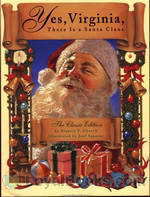 Yes, Virginia, There Is A Santa Claus
Yes, Virginia, There Is A Santa Claus
“Is There A Santa Claus?” was the headline that appeared over an editorial in the September 21, 1897 edition of the New York Sun. The editorial, which included the response of “Yes, Virginia, There is a Santa Claus,” has become an indelible part of popular Christmas lore in the United States. | |
By: Hilaire Belloc | |
|---|---|
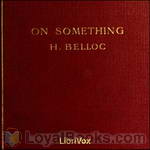 On Something
On Something
“Now that story is a symbol, and tells the truth. We see some one thing in this world, and suddenly it becomes particular and sacramental; a woman and a child, a man at evening, a troop of soldiers; we hear notes of music, we smell the smell that went with a passed time, or we discover after the long night a shaft of light upon the tops of the hills at morning: there is a resurrection, and we are refreshed and renewed.” – Hilaire Belloc | |
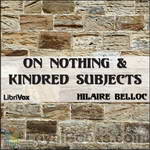 On Nothing & Kindred Subjects
On Nothing & Kindred Subjects
“I knew a man once, Maurice, who was at Oxford for three years, and after that went down with no degree. At College, while his friends were seeking for Truth in funny brown German Philosophies, Sham Religions, stinking bottles and identical equations, he was lying on his back in Eynsham meadows thinking of Nothing, and got the Truth by this parallel road of his much more quickly than did they by theirs; for the asses are still seeking, mildly disputing, and, in a cultivated manner, following the... | |
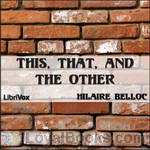 This, That, and the Other
This, That, and the Other
“When Fame comes upon a man well before death then must he most particularly beware of it, for is it then most dangerous. Neither must he, having achieved it, relax effort nor (a much greater peril) think he has done his work because some Fame now attaches thereto.” -- Hilaire Belloc | |
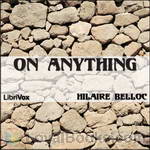 On Anything
On Anything
"Long before I knew that the speech of men was misused by them and that they lied in the hearing of the gods perpetually in those early days through which all men have passed, during which one believes what one is told, an old and crusty woman of great wealth, to whom I was describing what I intended to do with life (which in those days seemed to me of infinite duration), said to me, ( You are building castles in Spain.' I was too much in awe of this woman not on account of the wealth, but on account... | |
By: Robert Green Ingersoll (1833-1899) | |
|---|---|
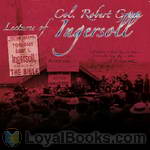 Lectures of Col. R. G. Ingersoll
Lectures of Col. R. G. Ingersoll
Colonel Robert Green Ingersoll (1833–1899) was a Civil War veteran, American political leader and orator during the Golden Age of Freethought, noted for his defense of atheism. This book is the first of two volumes collecting Ingersoll’s speeches. | |
By: G. K. Chesterton | |
|---|---|
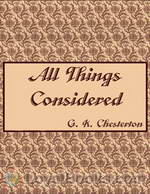 All Things Considered
All Things Considered
Another delightful and sharply pointed excursion into the topics of the day, and of this day as well, with Gilbert Keith Chesterton. These reprinted magazine articles are filled with his good natured wit, his masterful use of paradox, and devastating ability to use reductio ad absurdum to destroy the popular myths that drive a society driving full-speed into secular humanism. You will come away with a whole new collection of wonderful quotes. (Ray Clare) | |
By: Varous | |
|---|---|
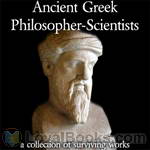 Ancient Greek Philosopher-Scientists
Ancient Greek Philosopher-Scientists
The Pre-Socratic Greek philosophers, that is, the philosopher-scientists who lived before or contemporaneously to Socrates, were the first men in the Western world to establish a line of inquiry regarding the natural phenomena that rejected the traditional religious explanations and searched for rational explanations. Even though they do not form a school of thought, they can be considered the fathers of philosophy and many other sciences as we have them now. None of their works is extant, so, in this collection, we present the textual fragments, when existing, of ten Pre-Socratic philosopher-scientists, and quotations and testimonials about them left by later authors... | |
By: Christopher Morley (1890-1957) | |
|---|---|
 Mince Pie
Mince Pie
Mince Pie is a compilation of humorous sketches, poetry, and essays written by Christopher Morley. Morley sets the tone in the preface: "If one asks what excuse there can be for prolonging the existence of these trifles, my answer is that there is no excuse. But a copy on the bedside shelf may possibly pave the way to easy slumber. Only a mind "debauched by learning" (in Doctor Johnson's phrase) will scrutinize them too anxiously." | |